Sixties
City presents
a wide-ranging series of
articles on all aspects of the Sixties, penned by the creator of the iconic
60s music paper Mersey
Beat
|
Sixties
City presents
a wide-ranging series of
articles on all aspects of the Sixties, penned by the creator of the iconic
60s music paper Mersey
Beat
|
|||||
|
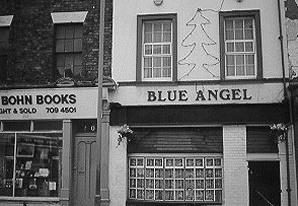 |
Personally,
my favourite Liverpool club was The Blue Angel. I remember sitting with
Allan Ginsberg, who described his excitement at being in Liverpool.
The combination of its energy and the personality of its people inspired him. The club was swarming with members and visitors. Apart from Liverpool artists such as The Beatles and Gerry & The Pacemakers, there were representatives of the media, ranging from the Saturday Evening Post to Man About Town, a TV team, a German film crew and leading journalists such as Nancy Spain, George Melly and Derek Taylor. No wonder Ginsberg was to say: "Liverpool is, at the present time, the centre of the consciousness of the human universe." The club, affectionately known as 'The Blue', was the after-hours watering hole of us all during the heyday of the Mersey scene. Situated next to an antiquarian bookshop at the top of Seel Street, near the city centre, it had previously been operating as the Wyvern Social Club. Allan Williams (left), who ran the nearby Jacaranda club in Slater Street, took over the premises in 1960. I'd been spending a lot of time at the Jacaranda, along with John Lennon, Stuart Sutcliffe, Paul McCartney, George Harrison and Pete Best, who were playing some gigs in the coffee bar basement. Allan had co-presented a rock'n'roll concert at the Liverpool Stadium with Larry Parnes, where Gene Vincent topped the bill and several local acts had supported. Parnes was impressed with the groups and mentioned to Allan that he was looking for a backing band for Billy Fury. Auditions, organised by Allan, were set up at the Wyvern. On May 10th 1960, the groups who auditioned were Cass & The Cassanovas, Derry & The Seniors, Gerry & The Pacemakers and Cliff Roberts & The Rockers. The Silver Beetles (whose drummer at the time was Tommy Moore) were a last minute addition to the occasion due to Stuart Sutcliffe asking Allan to give them a chance. When it was time for The Silver Beetles to play, their drummer hadn't turned up, so Johnny Hutchinson sat in with them for the first few numbers. |
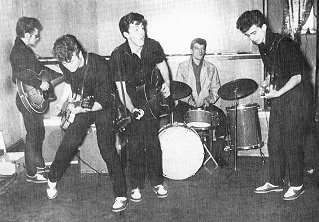 |
Moore then arrived and took over. The Silver Beetles appealed to Fury, but
Parnes told him the drummer wasn't suitable. Not only had he turned up late
but he was dressed differently from the other group members and was at least
ten years older than them. However, Parnes booked them on a short tour of
Scotland backing Johnny Gentle. He also booked Howie Casey & The Seniors to back another of his acts, but it was cancelled at the last minute. As Casey and his band had given up their day jobs to appear on the tour, Howie and singer Derry Wilkie turned up at the club to give Williams a serious talking to, but Allan was always able to talk himself out of a hole and persuaded them that he would drive the group down to the 2I's club in London. They were able to perform at the 2 I's, where they were spotted by German club owner Bruno Koshmider. As a result they became the first Liverpool band to be booked into Hamburg. Williams' dream was to operate a sophisticated night club. He'd visited The Blue Angel club in London and decided to adopt the title, decorating the main stairway with a huge blow-up of Marlene Dietrich from the film 'The Blue Angel'. The Blue opened on March 22nd 1961 with cabaret artist Alma Warren, backed by The Terry Francis Quartet. The club achieved a degree of media attention because Allan granted membership to his friends at the Press Club, in particular to Bill Marshall the local rep for the Daily Mirror newspaper. Press stories included the tale of the female snake charmer - who lost her snake at the club - and the real bullfighting sessions which took place with a baby bull. The Beatles and ourselves weren't initially granted membership as Allan didn't want elements of the local music scene around - he was trying to build an affluent and sophisticated clientele. However, the club didn't succeed as a cabaret venue (unlike the Cabaret Club in Duke Street) and Allan dropped his veto on The Beatles and other groups. |
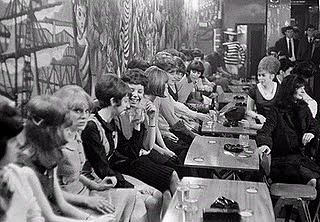 |
|
By that time Virginia
and I had launched Mersey Beat, the local rock'n'roll
scene was now attracting attention and, for the next few years, The Blue
became one of the most interesting clubs in the world. Initially the place
was crowded with members of groups who'd arrive shortly before midnight
after finishing gigs around the city. Other showbiz personalities such as
Tommy Steele, The Bachelors and Bruce Forsyth dropped by when they were
in Liverpool. Playwright Alun Owen told us he regularly visited Liverpool from his home in Wales to recharge his batteries. He had an 'ear' for dialogue and used to carry a notebook to jot down the phrases he heard, examples of the famous Scouse wit. Virginia had heard Pat Davies, Ringo Starr's girlfriend and Cilla Black's mate, utter the words "Who knitted your face and dropped a stitch?". Virginia told Alun and he used it in his stage musical 'Maggie May.' In fact, The Blue was the setting for the after-show party when 'Maggie May' made its debut in Manchester. We all drove back to Liverpool and poured into The Blue. On the ground floor there was a grand piano, with fruit machines on either side. I was playing one of the machines with Judy Garland and she told me she'd like to sing and could I find someone to play the piano?. No problem, I thought, with a club full of musicians - but no-one would volunteer (despite 'Over The Rainbow' being one of the songs in several Mersey group repertoires), so we missed the golden opportunity of a special performance from Judy. As the night progressed Allan had an argument with the legendary singer and told her to leave the club and never darken its doors again! He even ran after her car and kicked it! |
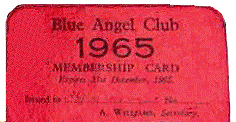 |
I'd become
friendly with The Rolling Stones soon after The Beatles had visited them
in Richmond and when I heard they were playing in Southport, phoned their
hotel, told Mick I was in The Blue and invited them down. They drove over
from Southport in their van, with their equipment, and got up on stage and
gave us a show. The Blue was a compact club, entered through a large copper-coloured
door guarded by a bouncer. The ground floor had a grand piano, various fruit
machines and a corner bar, with a door leading onto a patio. The basement featured a larger bar, a stage and a passage leading to the gents' toilet. The first floor sported two rooms, one with a large statue of a nude woman, the other with Sans Souci, a casino run by Barry Chang, Allan's brother-in-law. The second floor harboured the ladies' room and an office. Live entertainment was provided by resident bands and there were regular jam sessions. John Lennon and I usually drank in the downstairs bar. At one time I asked him if he had a song he could give to Beryl Marsden, a 15-year-old singer who was Liverpool's equivalent of Brenda Lee. He said he had one in mind, 'Love Of The Loved.' Next time I asked him about it he was apologetic: Brian Epstein had told him that, as manager, he would decide who would be given the Lennon & McCartney songs and he wanted to use them for his own stable of acts. There were various resident bands who played at The Blue, including The Escorts (at the time Ringo Starr's cousin was in the band and it was Ringo who arranged their residency) and The Nocturnes. Alun Owen liked The Nocturnes and they were hired to appear as 'the beat group' in the stage musical 'Maggie May.' Another friend of ours, Geoff Hughes, who worked as a salesman in the car showroom next to the Mersey Beat office, also managed to get a part in 'Maggie May.' |
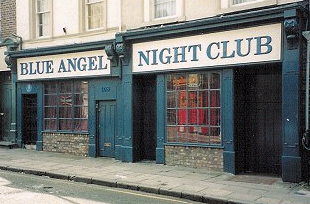 |
|
Article
Text
UK
web hosting by
|